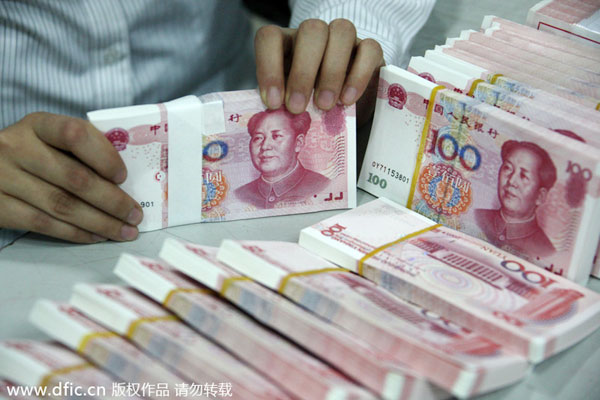A clerk counts yuan bills at a bank in Huaibei, East China's Anhui province. [Photo/IC]
Move to become 5th currency is supported by IMF staff, a signal banks can have confidence

Central banks around the world will likely hold more assets in Chinese currency in the future to diversify their foreign exchange reserves, economists said.
The experts are betting that the yuan will be included in the International Monetary Fund's Special Drawing Rights soon.
Reserve managers all over the world said in a poll that they predicted about 10 percent of global foreign exchange reserves will be held in yuan by 2025, up from the current 0.3 percent, according to a research note from global banking and finance giant HSBC.
If the drawing rights are granted by the IMF board at the end of November, the yuan will be the fifth currency in the basket, following the US dollar, the euro, the Japanese yen and the British pound.
The yuan has already won support from IMF staff, according to a statement from the fund, a signal to global users that the currency can be freely used and is stable as a store of value.
"The inclusion, which is very likely, confers international credibility," said Louis Kuijs, an economist at Oxford Economics. "It will probably make central banks, sovereign wealth funds and other financial market participants more comfortable to hold RMB denominated assets, although this will happen gradually," Kuijs said, using the acronym for the Chinese currency, also called the renminbi.
According to the IMF, by the end of the second quarter, 63.7 percent of the global total of foreign exchange reserves was denominated in US dollars, down from 64.1 percent in the first quarter.
IMF Managing Director Christine Lagarde said on Friday that she supports the staff's findings that the Chinese government has "addressed all remaining operational issues identified in an initial staff analysis submitted to the executive board in July".
The government has introduced a more market-oriented exchange rate regime, opened the interbank bond and foreign exchange market to foreign central banks, improved data transparency and continued development of offshore RMB markets.
"SDR inclusion shows China and other emerging economies that at least in some ways the existing international financial system is open to change and to newcomers, even as reform of voting shares at the IMF board is held up by the US Congress," Kuijs said.
The People's Bank of China, the country's central bank, issued a statement on Saturday that inclusion "would increase the representativeness and attractiveness of the SDR, and help improve the current international monetary system, which would benefit both China and the rest of the world".
Paul Mackel, head of research on global emerging markets and foreign exchange at HSBC, said, "It would encourage China to stick to a much-needed financial and capital account liberalization, to increase financial sophistication and improve the efficiency of capital allocation, which would facilitate the economy to be more consumption and service driven."
If the IMF executive board decides to include the yuan, the new basket of currencies would take effect on October 1, 2016, not at the calendar year's end.
This complies with rules made by the fund to ensure the smooth functioning of SDR-related operations after adding a new currency.
